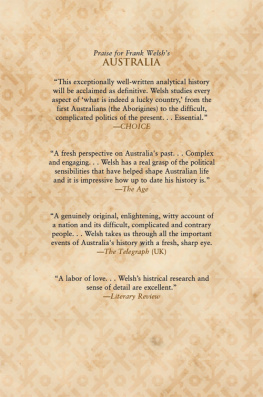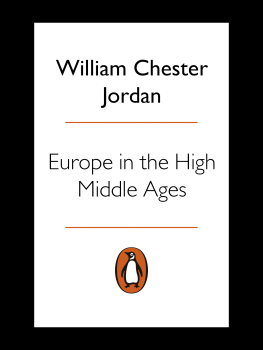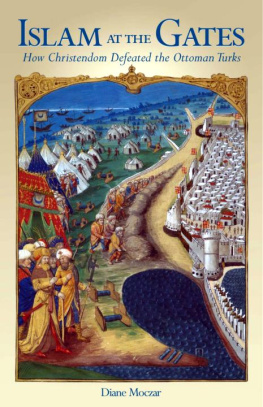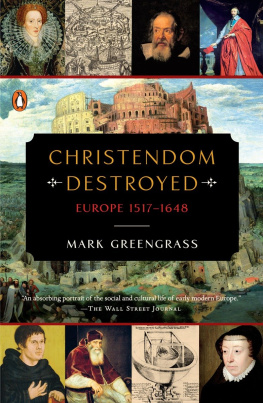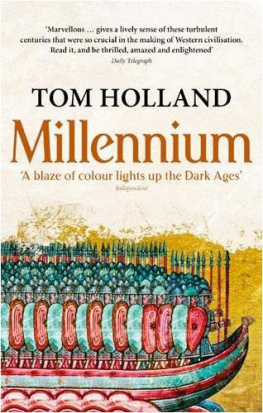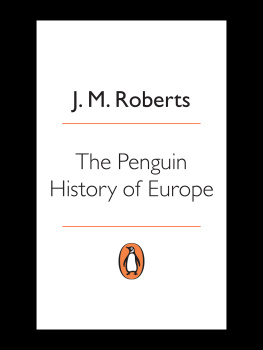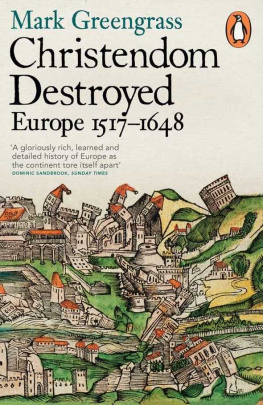First published in the United States in 2008 by
The Overlook Press, Peter Mayer Publishers, Inc.
New York, NY
141 Wooster Street
New York, NY 10012
www.overlookpress.com
For bulk and special sales please email ,
or write us at the above address.
Copyright 2008 by Frank Welsh
All Rights Reserved. No part of this publication may be reproduced or transmitted in any form or by any means, electronic or mechanical, including photocopy, recording, or any information storage and retrieval system now known or to be invented without permission in writing from the publisher, except by a reviewer who wishes to quote brief passages in connection with a review written for inclusion in a magazine, newspaper, or broadcast.
Maps by Chris Summerville
ISBN 978-1-4683-1525-7
THE B ATTLE FOR
CHRISTENDOM
T HE C OUNCIL OF C ONSTANCE ,
THE E AST -W EST C ONFLICT ,
AND THE D AWN OF M ODERN E UROPE
FRANK WELSH
A t the dawn of the fifteenth century, Islam invaded Europe from the East and it seemed that Christendom itself was under threat. In an attempt to save the Christian world, the Holy Roman Emperor Sigismund called a conference at Constance, beside the Rhine. The council attracted the greatest minds in the western world, as well as innumerable princes, lawyers, and prostitutes.
In The Battle for Christendom, eminent historian Frank Welsh delves into this important international meeting and shows that it is in fact one of the central events in European history. Schism had ravaged the Catholic Church and three Popes were claiming the seat of St. Peters. The council would be a critical turning point in European historythe last event of the medieval world, heralding the dawn of the renaissance and the rise of humanism. Yet it would also contain a darker truth and with the burning of the Czech divine, Jan Hus, was the opening salvo of the Reformation. The story rises to a conclusion on the battlements of Constantinople in 1453 where, despite all of Sigismunds attempts to repel the Ottomans, Islam militantly took up the challenge.
In Welshs lively retelling, The Battle for Christendom is an exciting and readable story that holds lessons for our own times of international turmoil.
For our Texan grandchildren, James and Robert Young
In 1938 Prime Minister Neville Chamberlains dismissal of Hitlers threat to Czechoslovakia as a quarrel in a faraway country between people of whom we know nothing was disgraceful, but probably in accordance with the general British view. Apart from the obvious geographical howler Prague and Nice, that favourite English watering place, are equidistant from London pre-war Britons were comfortably ignorant of Europe east of the Rhine and north of the Alps. Today cheap flights have made cities such as Prague and Budapest popular tourist destinations, and at least Czech literature is better known, with Franz Kafka and Jaroslav Haek accepted as major writers, but the British conception of history remains resolutely provincial. The date 1415 is one of the few that have some resonance, as being that of Agincourt, yet that battle had only short-term and limited effects, while the international Congress being held at the same time in the German city of Constance changed the course of European history.
My own interest in that episode began many years ago when reading for the Cambridge History Tripos under the guidance of Dom David Knowles. At that time my particular interest was in the divergence between such reformers as Jean Gerson, striving to remain within the traditional bounds of Church authority, and those such as Jan Hus, reluctantly prepared to defy it. Since then, my experience in international business and with government bodies demonstrated how a combination of persuasion, coercion and a clear demonstration of economic advantages can influence events. Spending some time with one colleague in Africa extracting eventually successfully due payment from a reluctant francophone government gives one something of a feeling for the problems of medieval rulers.
This in turn focused my attention on the man who convened and presided over the Council at Constance: Sigismund of Luxembourg, German Emperor and King of Hungary. Without Sigismunds personal qualities the Council would never have succeeded: it was his phenomenal energy, patience (not inexhaustible) charm and ruthlessness, coupled with a remarkable command of languages (French, German, Latin, Czech, Hungarian and Italian) that pushed the heterogeneous convention of popes, prelates and magnates into taking the hard decisions that rescued Christian Europe from the danger of imminent disintegration; and when crisis threatened, deployed the military force to avert it.
Yet Sigismund, it seemed, had been entirely neglected by British and American historians. In the 1,365 pages of Professor Norman Daviess monumental work Europe Sigismund appears once (and not at all in the index), while one recent writer on the Ottoman Empire (Jason Goodwin in Lords of the Horizons) suppresses him entirely, replacing him with a fictitious King Ladislas. Nor have Czech or Hungarian historians thought much to Sigismund. The Kutn Hora Museum has simply omitted him from the list of Luxembourg Bohemian kings: Pal Engel records that modern historiography has regarded him as one of the worst [of Hungarian rulers]. Such views are, however, changing: after reviewing his achievements Professor Engel concluded that when viewed in a European context, Sigismund can be seen as an outstanding figure in history. Miklos Molhar concurs: Sigismund was a prestigious emperor and a Hungarian king of calibre. He remains the most important sovereign of his era. A glance at the map shows Sigismunds importance, in control (sometimes precariously) of vast territories extending from the Black Sea and the Mediterranean to the Baltic and the North Sea, with the rest of Europe acknowledging at least his moral authority.
I hope therefore that this short book may help to revive interest in this little-known period, while being conscious that the importance of the subject deserves a more thorough treatment.
This book would never have seen the light of day without the enthusiasm of Jonny Pegg seconded by Shaheeda Sabir at Curtis Brown and Leo Hollis at Constable & Robinson, who worked far beyond the call of duty; nor indeed without the encouragement over many years of the late and much-missed Andrew Best. Invaluable help with German problems was given by Max and Sophie Rehmet; in Konstanz the staff of Homburger and Hepp and the Bucherstube am Zee, together with the Bucher Zentrum Unna, produced the essential texts. JP Bonnet and the staff of the University of Poitiers, and the Centres des tudes Mdivales and the Mdiathque provided a valuable resource. Paul Collins in Canberra gave wise advice and Tony Bernard industriously researched Hussite militaria. But as with all our other books the patient, long-suffering and multi-talented Agnes, here with technical advice from Susie Kelly, deserves most of the credit.
Some Monuments
Visitors coming to the ancient city of Constance across the misty waters of the Bodensee are greeted by two monuments. One is a chaste obelisk commemorating Graf Ferdinand von Zeppelins invention, the airship, the first of which flew from nearby Friedrichshaven in 1900. The second is decidedly unchaste, and much more impressive.
The colossal statue of Imperia, thirty feet tall, weighing nine tons, smiles suggestively from the pierhead. She is long-legged, full-breasted, poised on high heels, wearing a G-string and a revealing gown. On each of her huge outstretched hands sits a naked mannikin; on the left a crowned and bearded emperor, and on the right a mitred pope, legs demurely crossed; all revolve slowly, a full turn in four minutes. They commemorate the Council of Nations which assembled here in 1414 and defined the future of Europe for the next century. The Emperor is Sigismund, King of the Germans, of Hungary and of Bohemia, and Holy Roman Emperor, who presided over the Council; the Pope is Martin V, appointed by the Council, to end the schism which had divided the Catholic Church for nearly forty years. The lady herself can be taken to represent some of the literally thousands of sporting girls who came to lighten the task of the clergymen, professors and diplomats while they continued their deliberations for three years: it is not recorded that any of the girls starved.

